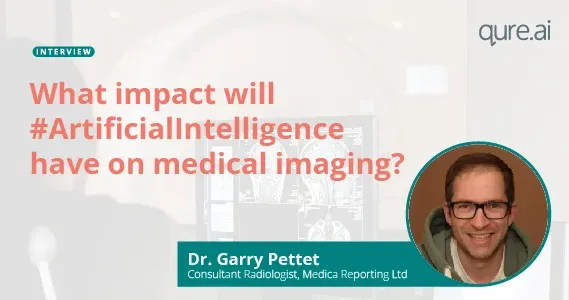
Back
Dr. Garry Pettet, Consultant Radiologist at Medica, shared his experiences on integrating AI technology into Medica’s teleradiology workflow and its impact on patient care and operational efficiency. Medica, one of the UK’s largest teleradiology firms, collaborates with over a hundred NHS trusts, handling around 1.5 million imaging studies annually, including CT, MR, and plain film. Dr. Pettet, with his unique background in radiology and software engineering, has been at the forefront of Medica’s Future Tech initiatives, focusing on innovations to make imaging safer, more accurate, and faster.
The partnership with Qure.ai began over a year ago, with Medica implementing Qure’s qER algorithm, designed to detect critical abnormalities like intracranial hemorrhage on head CTs. Dr. Pettet noted that the integration of AI was motivated by the need to improve patient safety, reduce turnaround times, and enhance accuracy. With qER, Medica can now prioritize scans flagged as abnormal, getting them into the hands of radiologists more quickly, which has been crucial for managing cases that require immediate attention. Dr. Pettet explained that qER’s ability to prioritize scans based on clinical urgency allows Medica to move away from a strict first-in, first-out system, resulting in faster responses to high-risk cases and better patient outcomes.
AI integration with Medica’s bespoke systems has been seamless, thanks in part to Qure.ai’s flexibility and the technical support provided by its team. Dr. Pettet emphasized the collaborative nature of the partnership, noting that Qure.ai’s agile approach has allowed for smooth adjustments to suit Medica’s unique requirements. Beyond faster reporting times, Dr. Pettet and his colleagues have seen the qER algorithm improve diagnostic accuracy. Radiologists have expressed gratitude for qER's "second-look" capability, which has helped catch potential oversights, contributing to safer and more reliable reporting.
While turnaround time remains critical, Dr. Pettet underscored that the broader benefits of AI extend to overall operational efficiency and cost savings. With AI enhancing the speed and accuracy of reporting, Medica can process a higher volume of scans with the same resources, reducing costs. For the NHS, similar AI applications could yield significant cost savings through more efficient workflow management. Although AI is not yet ready to independently generate full diagnostic reports, its role as an adjunct tool has proven invaluable for prioritization and error reduction.
Reflecting on the future, Dr. Pettet envisions an even greater role for AI in healthcare, where it acts as a powerful assistant to radiologists. He appreciates the positive impact Qure.ai has had on Medica’s operations and is optimistic about the potential for AI to transform teleradiology. This collaboration has not only enhanced patient care but also positioned Medica at the cutting edge of digital healthcare technology.